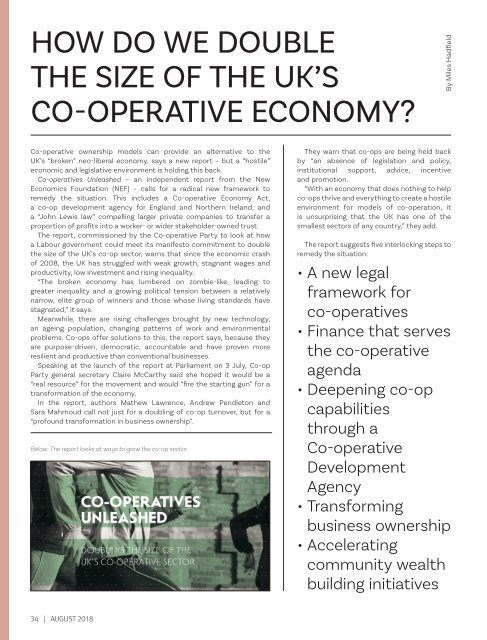AUGUST 2018
The August edition of Co-op News looks at how the co-operative movement can grow - but also thrive. Plus case studies from the US worker co-op movement, and how co-ops are embracing spoken word to tell the co-op story.
The August edition of Co-op News looks at how the co-operative movement can grow - but also thrive. Plus case studies from the US worker co-op movement, and how co-ops are embracing spoken word to tell the co-op story.
Create successful ePaper yourself
Turn your PDF publications into a flip-book with our unique Google optimized e-Paper software.
HOW DO WE DOUBLE<br />
THE SIZE OF THE UK’S<br />
CO-OPERATIVE ECONOMY?<br />
By Miles Hadfield<br />
Co-operative ownership models can provide an alternative to the<br />
UK’s “broken” neo-liberal economy, says a new report – but a “hostile”<br />
economic and legislative environment is holding this back.<br />
Co-operatives Unleashed – an independent report from the New<br />
Economics Foundation (NEF) – calls for a radical new framework to<br />
remedy the situation. This includes a Co-operative Economy Act,<br />
a co-op development agency for England and Northern Ireland, and<br />
a “John Lewis law” compelling larger private companies to transfer a<br />
proportion of profits into a worker- or wider stakeholder-owned trust.<br />
The report, commissioned by the Co-operative Party to look at how<br />
a Labour government could meet its manifesto commitment to double<br />
the size of the UK’s co-op sector, warns that since the economic crash<br />
of 2008, the UK has struggled with weak growth, stagnant wages and<br />
productivity, low investment and rising inequality.<br />
“The broken economy has lumbered on zombie-like, leading to<br />
greater inequality and a growing political tension between a relatively<br />
narrow, elite group of winners and those whose living standards have<br />
stagnated,” it says.<br />
Meanwhile, there are rising challenges brought by new technology,<br />
an ageing population, changing patterns of work and environmental<br />
problems. Co-ops offer solutions to this, the report says, because they<br />
are purpose-driven, democratic, accountable and have proven more<br />
resilient and productive than conventional businesses.<br />
Speaking at the launch of the report at Parliament on 3 July, Co-op<br />
Party general secretary Claire McCarthy said she hoped it would be a<br />
“real resource” for the movement and would “fire the starting gun” for a<br />
transformation of the economy.<br />
In the report, authors Mathew Lawrence, Andrew Pendleton and<br />
Sara Mahmoud call not just for a doubling of co-op turnover, but for a<br />
“profound transformation in business ownership”.<br />
Below: The report looks at ways to grow the co-op sector<br />
They warn that co-ops are being held back<br />
by “an absence of legislation and policy,<br />
institutional support, advice, incentive<br />
and promotion.<br />
“With an economy that does nothing to help<br />
co-ops thrive and everything to create a hostile<br />
environment for models of co-operation, it<br />
is unsurprising that the UK has one of the<br />
smallest sectors of any country,” they add.<br />
The report suggests five interlocking steps to<br />
remedy the situation:<br />
• A new legal<br />
framework for<br />
co-operatives<br />
• Finance that serves<br />
the co-operative<br />
agenda<br />
• Deepening co-op<br />
capabilities<br />
through a<br />
Co-operative<br />
Development<br />
Agency<br />
• Transforming<br />
business ownership<br />
• Accelerating<br />
community wealth<br />
building initiatives<br />
34 | <strong>AUGUST</strong> <strong>2018</strong>


















